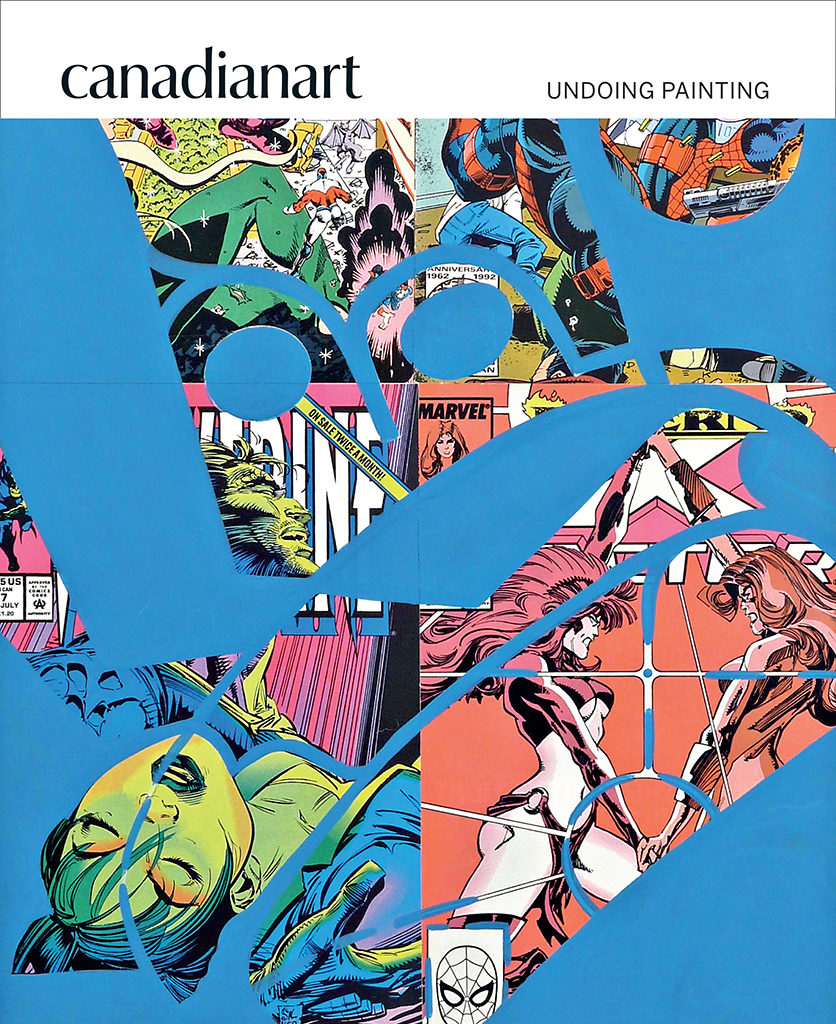1.75 US 2.15 CAD
Chalk paint and Marvel comic book pages on rag paper, 62.2 x 39 cm, 2018. Private collection. Courtesy the artist / Equinox Gallery.

Available from September 15 to December 14, 2019
In this issue, we are undoing. An undoing is a loosening, an overturning—it’s a way of making space for new things to emerge. Its temporalities are not set; it can be a quick correction or a process of trial and error, a distillation or a reconfiguration. To undo is to recognize that the canons, legacies and histories of art that so often feel entrenched can shift, can be let go. And painting—well, what is painting? Everyone who contributed to this issue, and likely everyone reading it, will have a different answer. It’s bound to be personal; painting brings with it such formal, conceptual and political baggage. But that’s a generative point from which to start: not to ignore painting’s legacy but to unravel it, to pull at threads and see where they lead. For many artists, the question of how art can re-form and re-vision itself against the crises of our time is paramount.
It’s a question for this magazine too. Ebbing and flowing with changing conversations around art, magazines are a persistent forum for asking what art is, and what it can be. We’ve been thinking about how a 21st-century print publication can be a channel, a platform, for contemporary art first and foremost. You’ll see more artists contributing, and more artists’ voices speaking to their practices and the stories behind them. We’ve been rethinking our institutional structure too, expanding our advisory committees to bring in different perspectives, and seeking new forms of accountability to multiple publics.
For the first time, an issue of Canadian Art has two distinct covers—both are works by Sonny Assu from his series of comic book collages. Taking the superheroes of a beloved art form and intervening by painting formlines directly on the pages, Assu reimagines what such stories can be. For us, the multiple covers are a way to break form, giving a nod to the comic book, arguably the most widely distributed kind of art book. Part of this “undoing” issue is about questioning what we do as an art publication, and inviting artists to help us do that. The covers are a response, and they’re just a beginning.
Features
How to Break a Painting
Cindy Phenix condenses feminism and desire into paintings that take sexist tropes head-on
Outer Limits
A conversation between artists Marie-Claire Blais, Julie Trudel and Caroline Monnet about the edges of space, colour, material and tradition in practices that push painting beyond control
Seeing Through
“With my art practice and my paintings, I am trying to imagine a world where colonialism hasn’t touched my life in some way.”
The Skylight Caper
One of the world's greatest unsolved art thefts happened in Montreal in 1972. And its mystery continues
Stardust and Blood
This is a letter to my father, to honour him and how he taught me to paint our world with beautiful colour
Group Theory
For Black queer organizers in the 1980s and ’90s, creative labour was as important as activist practice, and vice versa
Constellations
Like a compass without a needle or a map without a grid, Hajra Waheed’s work uses technologies of orientation to disorient perception, asking us to think differently about surveillance, security and the stories we have in common
Spotlight
Off the Wall
A national survey of 10 artists who take painting outside the frame
Cover Images
1.75 US 2.15 CAD
Chalk paint and Marvel comic book pages on rag paper, 62.2 x 39 cm, 2018. Private collection. Courtesy the artist / Equinox Gallery.
Giant Sized Spectacular, #11
Acrylic ink and Marvel comic book pages on cotton paper, 55.8 x 33.6 cm, 2017. Private collection. Courtesy the artist / Equinox Gallery.
Artist Project
The Speculator Boom
Preview
Conversations with artists and curators on upcoming projects
Keynote
Fiction
Legacy
Some Other Refusals
The Automatists built a generation of genre-defying art. But they also left instructions for how to question the canon that praised them
Dialogue
Rogue Archaeology
Two artists discuss dark energy, living media and the liveliness of the materials they paint with—from bitumen and coal to algae and pollen
Reviews
Overheard